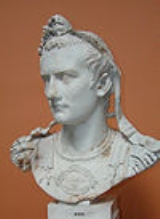
Caligula
Gaius Julius Caesar Augustus Germanicus (31 August 12 – 24 January 41), most commonly known as Caligula, was the third Roman Emperor and a member of the Julio-Claudian dynasty, ruling from 37 to 41. "Caligula" was actully a childhood nickname meaning "Little [Soldier's] boots" that he came to hate.
Sourced
- Utinam populus Romanus unam cervicem haberet!
- Would that the Roman people had but one neck!
- As quoted in The Twelve Caesars: Gaius Caligula by Suetonius, as translated by Alexander Thomson
Unsourced
- Adhuc Vivo!
- I still live!
- Reportedly his last words, shouted as he was being stabbed by his own bodyguards
Disputed
- Let them hate me, so that they will but fear me.
- Quoted in The Tyrants : 2500 Years of Absolute Power and Corruption (2006), p. 27 London: Quercus Publishing, ISBN 1905204965 , these derive from a statement by Suetonius, included below, in which he states these words were often used by Caligula, but imply that he was quoting a tragedian.
-
- Variant translation: Let them hate (me) so long as they fear (me).
Suetonius
- Quotes from The Twelve Caesars: Gaius Caligula by Suetonius as translated by Alexander Thomson
- Having punished one person for another, by mistaking his name, he said, "he deserved it quite as much." He had frequently in his mouth these words of the tragedian,
-
- Oderint dum metuant.
I scorn their hatred, if they do but fear me.
- Oderint dum metuant.
- He devised a novel and unheard of kind of pageant; for he bridged the gap between Baiae and the mole at Puteoli, a distance of about thirty-six hundred paces, by bringing together merchant ships from all sides and anchoring them in a double line, afterwards a mound of earth was heaped upon them and fashioned in the manner of 'Appian Way. Over this bridge he rode back and forth for two successive days... know that many have supposed that Gaius devised this kind of bridge in rivalry of Xerxes, who excited no little admiration by bridging the much narrower Hellespont; others, that it was to inspire fear in Germany and Britain, on which he had gardens, by the fame of some stupendous work. But when I was a boy, I used to hear my grandfather say that the reason for the work, as revealed by the emperor's confidential courtiers, was that Thrasyllus the astrologer had declared to Tiberius, when he was worried about his successor and inclined towards his natural grandson, that Gaius had no more chance of becoming emperor than of riding about over the gulf of Baiae with horses.
Philo
- Quotes from .
- But in the eighth month a severe disease attacked Gaius who had changed the manner of his living which was a little while before, while Tiberius was alive, very simple and on that account more wholesome than one of great sumptuousness and luxury; for he began to indulge in abundance of strong wine and eating of rich dishes, and in the abundant license of insatiable desires and great insolence, and in the unseasonable use of hot baths, and emetics, and then again in winebibbing and drunkenness, and returning gluttony, and in lust after boys and women, and in everything else which tends to destroy both soul and body, and all the bonds which unite and strengthen the two; for the rewards of temperance are health and strength, and the wages of intemperance are weakness and disease which bring a man near to death.
- II, sec. 14.
- You [=Caligula], O most wretched of men! having filled every continent and every island with good laws, and principles of justice, and wealth, and comfort, and prosperity, and abundance of other blessings, you, wretched man, full of all cowardice and iniquity, who have emptied every city of all the things which can conduce to stability and prosperity, and have made them full of everything which leads to trouble and confusion, and the most utter misery and desolation.
- XII, sec. 90.
- But the madness and frenzy to which he gave way were so preposterous, and so utterly insane, that he went even beyond the demigods, and mounted up to and invaded the veneration and worship paid to those who are looked upon as greater than they, as the supreme deities of the world, Mercury, and Apollo, and Mars.
- XIII, sec. 93.
- But in the eighth month a severe disease attacked Gaius who had changed the manner of his living which was a little while before, while Tiberius was alive, very simple and on that account more wholesome than one of great sumptuousness and luxury; for he began to indulge in abundance of strong wine and eating of rich dishes, and in the abundant license of insatiable desires and great insolence, and in the unseasonable use of hot baths, and emetics, and then again in winebibbing and drunkenness, and returning gluttony, and in lust after boys and women, and in everything else which tends to destroy both soul and body, and all the bonds which unite and strengthen the two; for the rewards of temperance are health and strength, and the wages of intemperance are weakness and disease which bring a man near to death.
